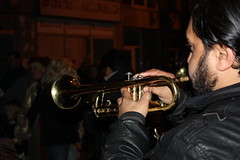Epiphany or Theophany is when Eastern Christians commemorate the baptism of Jesus in the Jordan River, seen as his manifestation to the world as the Son of God. In Greece, January 6 is traditionally known as Phota (“lights”) and customs revolve around the Great Blessing of the Waters: a cross is thrown into the water and people try to retrieve it in order to receive good luck and blessings. The day before, children sing Epiphany carols, and the following day, January 7, marks John the Baptist's feast.
This video shows a Theofaneia celebration in Lake Vegoritis, Northern Greece:
Throughout Greece, old village and island traditions and customs still survive [Greek] and are observed [Greek] by local inhabitants and visitors. Join us for a small virtual tour of folk history.
Kastoria: Ragkoutsaria
The first carnival of the year takes place at Kastoria in West Macedonia, Northern Greece and lasts until January 8. During Ragoutsaria (from the Latin “rogatores”, meaning “beggars”), people wear sheepskins, put masks on or paint their faces and body black and wander the streets carrying huge brass bells; their striking sound sends away all evil spirits. The celebration is accompanied by lots of traditional music played on brass instruments.
@taskar: Τα “Ραγκουτσάρια” στην Καστοριά αποδεικνύουν πως η Μακεδονία είναι μία και είναι Μουσική (χωρίς σύνορα).
@Nistiko_Arkoudi: Πάμε Λευκάδα όπου το ιδιαίτερο έθιμο κατά την διάρκεια τού αγιασμού των υδάτων είναι τα πορτοκάλια…
On the Ionian island of Lefkada, people celebrate the custom of the oranges: they dive into the sea holding oranges tied with twine. Before the blessing of the waters, they throw last year's old oranges into the water. Afterwards, they carry them back to their homes for blessing and leave one near the holy icons for the rest of the year. This custom dates [Greek] from the period of the Venetian occupation of the island (1684-1797); back then, the ritual would take place at the old city aqueduct near the citrus groves of noble landowners.
Nea Karvali, Kavala: Sagia
In the town of Nea Karvali in Eastern Macedonia, Northern Greece, inhabitants celebrate Sagia every year on Epiphany Eve. They gather around big fires lit in squares, where they drink, sing traditional carols and dance. The ritualistic fires are meant to drive away the evil spirits, the “kalikantzaroi” (Christmas goblins), to the bowels of the earth; the tradition has its origins from Cappadocia of Asia Minor, from where the current inhabitants’ ancestors immigrated in a 1923 population exchange.
Ermioni, Argolis: Giala-Giala
For more than 50 years, the tradition of Giala-Giala has existed [French] in Ermioni in Argolis in the Eastern Peloponnese. On Epiphany Eve, young men gather at the town port and decorate boats with palm leaves. Next morning, they dress in traditional naval uniforms and make a tour of the village gathering offerings and blessings. They sing traditional tunes until the priest casts the cross into the water and they reach to catch it.








2 comments